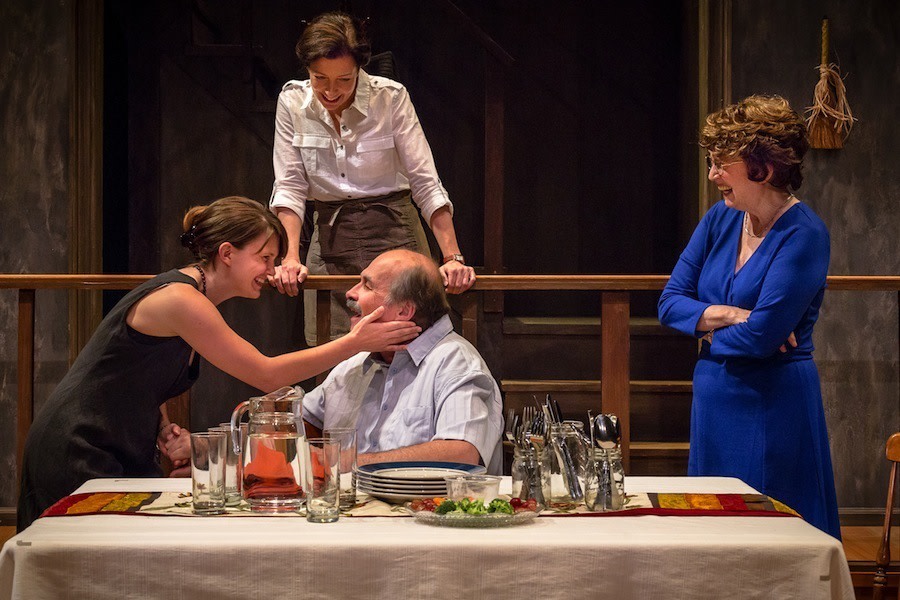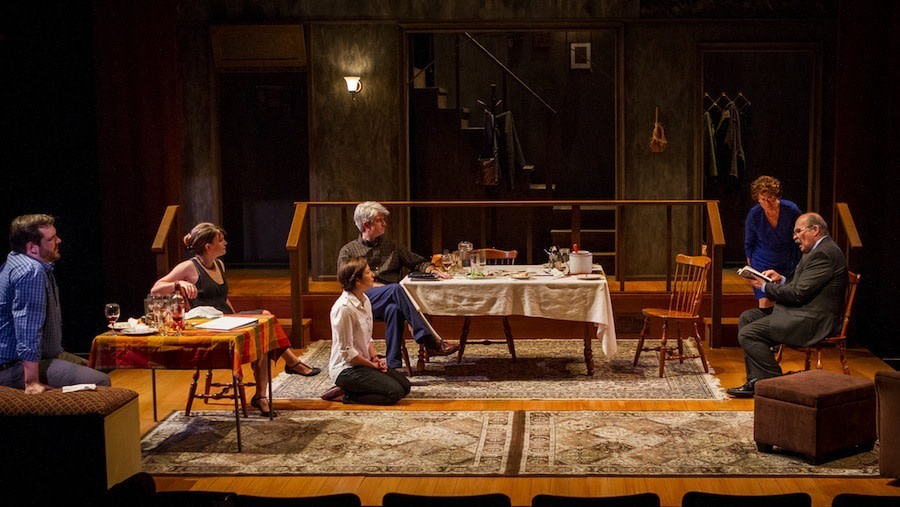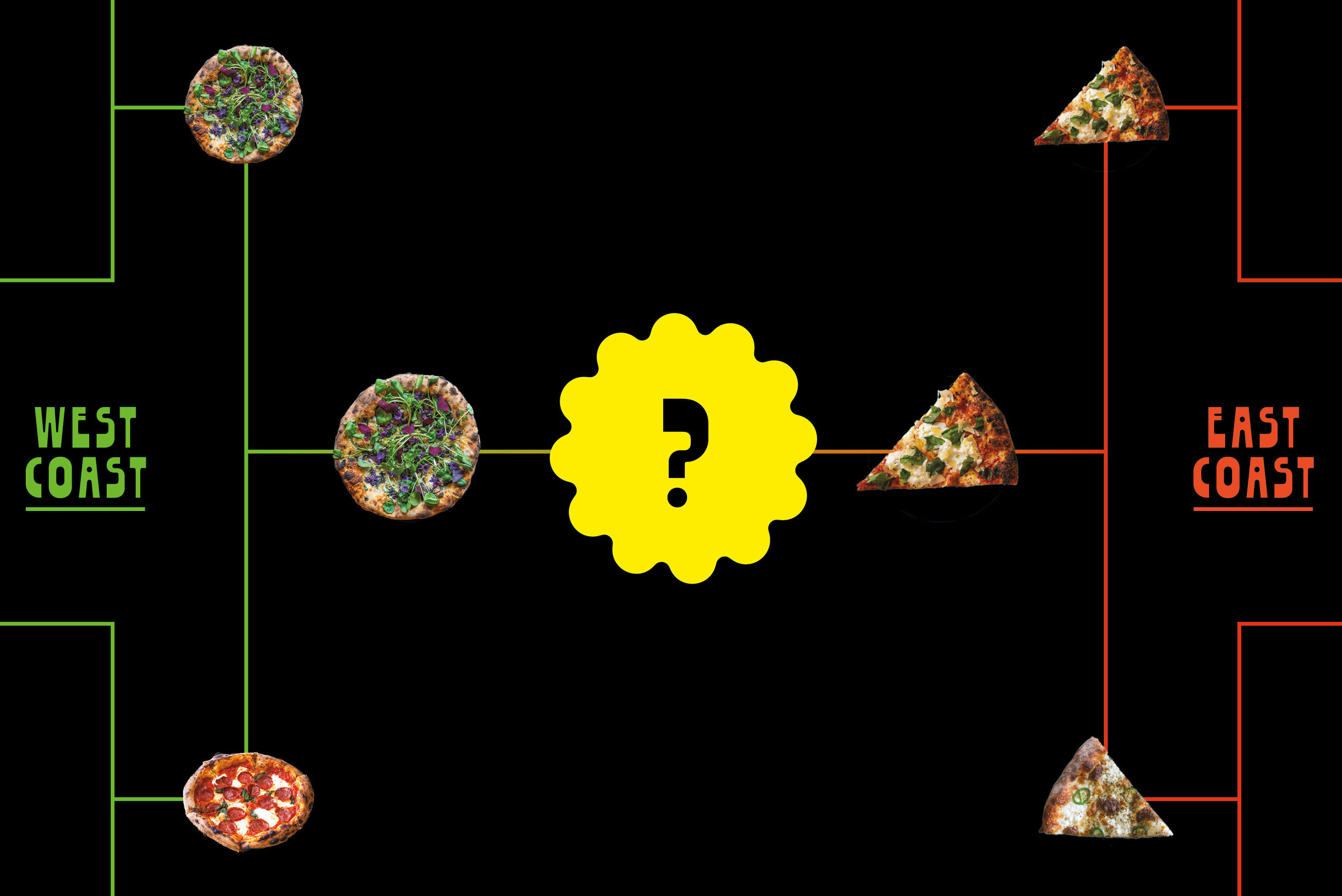Review: Third Rail’s 'Sweet and Sad'

Image: Owen Carey
Third Rail Repertory’s Sweet and Sad, is, of course, sweet and sad. It’s also funny, well-acted, and at times grating. Which, in varying combinations, probably sums up most families.
The second play in Richard Nelson’s Apple family series, Sweet and Sad doesn’t so much pick up where last year’s That Hopey Changey Thing left off, at least chronologically, as it dives deeper into the family’s story. Hopey Changey, which opened at New York’s Public Theater on the night of the 2010 midterm elections, set us a place at the table of an everyday liberal family spread between New York City and the Hudson valley town of Rhinebeck. Sweet and Sad takes place one year later on the tenth anniversary of 9/11 (once again, the same night it opened), and follows the same chiastic structure: the play opens on the adult siblings coming together and setting the table for a meal and closes with them cleaning up and going their separate ways (although in this case some stay the night).
In my review of Hopey Changey, I wrote:
While the humor, drama, and astute depictions still ring true, I’m delighted to report that Sweet and Sad, named for a line from Walt Whitman's poem "The Wound Dresser," serves up much higher stakes. As the family discusses the meaning of memory, loss, and compensation around the 9/11 attacks, their conversation slowly unveils a no less life-altering tragedy in one of the character’s lives since we last saw them—although to share it would be to spoil its finely woven revelation.
And while the ensemble’s acting on last year’s opening night seemed overdone, they have settled this year. Their interplay and banter feeling much more natural—helped in part by a script that has toned down its high-mindedness—allowing us to digest the bigger philosophical questions of the play without feeling drubbed over the head.
Third Rail Repertory Theatre: Sweet and Sad
Winningstad Theatre
Thru Oct 20
Bruce Burkhartsmeier, as the charming, amnesia-addled uncle Benjamin, continues to dish the strongest humor, as well as the play’s most poignant exploration of memory. Rebecca Lingafelter has dialed down the nervousness of the youngest sister, Jane, falling into a much more comfortable portrayal, despite the now rather off-putting relationship mind-meld with her boyfriend, Tim (another fine turn by Isaac Lamb as the only outsider), who continues to struggle as an actor, showing an interest in living in Rhinebeck (foreshadowing?!). Sole brother Richard (Michael O’Connell at his comedic best) has gone to the dark side of a private law firm and has started watching Fox, although his nuanced political questioning seems the most thought-provoking. Jacklyn Maddux’s Barb, the eldest, has grown wiser and more confident. And Maureen Porter, who I thought was the strongest in last year’s cast, bears the tragedy of the play on her beaten down shoulders, shrugging it off at times, but ultimately filling us with sadness.
My primary complaint with the show lies with Nelson’s script. While we get more of an arc this time, the endless sibling dysfunction—needling, criticism, sharing of each other’s secrets, telling each other what to do—starts to bog it down and sap its authenticity. We bounce back and forth between bickering and humor and care so often that I started to feel like a ping-pong ball, and in turn I started to grow numb to their tensions. I like that the dialogue circles around its deeper political and philosophical issues like an eagle in a thermal instead of taking them on linearly, but in an entirely dialogue driven play, the feeling of repetition left me uncomfortably stuffed.
That said, like most big meals, the lingering discomfort tends to fade in one’s member quicker than the joy and meaning of the meal. I look forward to our next reunion.

The Apple family watches as uncle Ben (Bruce Burkhartsmeier) reads Walt Whitman's "The Wound Dresser."
Image: Owen Carey




